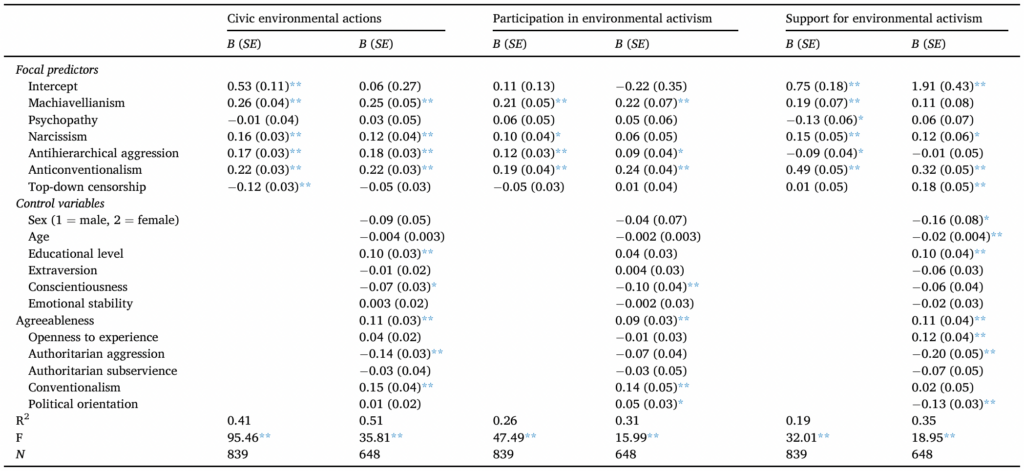In recent months, the environmentalist group ‘Just Stop Oil’ has earned a reputation for particularly deranged acts of protest, such as blocking traffic on busy roads and chucking paint over priceless works of art. Could such obstreperous behaviour reflect the personalities of the activists?
In a new study, the psychologist Hannes Zacher explores what he calls the “dark side” of environmental activism. He administered a survey to a sample of 839 Germans in full-time employment. Respondents were asked about their involvement in, and support for, environmental activism. Items included, “In the last six months, I took part in a protest/rally about an environmental issue,” and “I support the actions of the organization ‘Fridays for Future’ [an environmentalist group in Germany]”.
In addition, respondents were asked to complete several personality tests. There was a test measuring the ‘dark triad’ traits (Machiavellianism, psychopathy and narcissism) – which included items such as, “I tend to manipulate others to get my way,” and “I tend to want others to admire me”. There was also a test measuring a trait called ‘left-wing authoritarianism’ – which included items such as, “The rich should be stripped of their belongings and status,” and “The ‘old-fashioned ways’ and ‘old-fashioned values’ need to be abolished”.
What did Zacher find? Both involvement in environmental activism and support for environmental activism were positively associated with all three dark triad traits and with two aspects of left-wing authoritarianism. The correlations were not trivial either – ranging from r = .15 to r = .52. In other words, environmental activists in Germany tend toward Machiavellianism, psychopathy, narcissism, anti-hierarchical aggression and anti-conventionalism.
Zacher also ran multivariate models, where he looked at the effect of each psychological measure controlling for demographic characteristics like age, sex and education (and controlling for the other measures). The results are shown below.

As you can see, Machiavellianism, anti-hierarchical aggression and anti-conventionalism were consistent predictors of involvement in environmental activism, while narcissism and anti-conventionalism were consistent predictors of support for environmental activism. Hence the associations Zacher observed could not simply be attributed to confounding by demographic characteristics – not in every case, at least.
As an aside, including all the psychological measures in the same model was a slightly odd analytical choice on Zacher’s part, since some of them are quite highly correlated – which can make it hard to interpret the results. In my view, running a separate multivariate model for each measure makes more sense. It’s possible that, had the author done so, all the associations would have remained statistically significant.
The author notes that his findings support the ‘dark-ego-vehicle principle’, which suggests that “people with high levels of the dark triad traits may use activism as a means to satisfy their ego-focused needs”.
He also points out that environmental activists may be particularly effective at changing people’s attitudes in virtue of their dark triad traits. And this seems plausible: environmentalists in Germany managed to get the country to abandon nuclear power – despite this being the only large-scale and reliable alternative to fossil fuels.
A useful follow-up would be to repeat the study on a British sample. We could see whether the same applies to ‘Just Stop Oil’ activists.














To join in with the discussion please make a donation to The Daily Sceptic.
Profanity and abuse will be removed and may lead to a permanent ban.
They are mentally ill.
and don’t understand basic science or history since about 1750
Don’t usually have such impressive teeth either (apart from the trustafarians with expensive orthodontists)
Just grade A A-holes.
Interesting, but I would also suggest that the Dark Triad would also incorporate politicians, NGO’s and the so called technocrats. It often raises a smile, when someone accuses someone else of Machiavellianism whilst showing all the traits of being Machiavellian themselves.
It’s really common since they project! It’s like bullies accusing others of bullying them.
Or misogynists accusing women of “misandry”, while continuing to demonstrate their sexist and hostile attitudes towards women. The lack of self-awareness…🤦♂️🤦♀️🤦
I just take ppl as I find them, don’t buy in to ism any more than I buy in to RNA shots. Someone on here brighter than I wrote isms cause schisms which I think is generally true.
They may not individually be narcissists but certainly groups like ER have many traits of narcissism e.g. wanting admiration, “showing off”, claiming to be the only people who have the answer, denigrating anyone who challenges them, primitive defences (splitting, projection), inability to empathise etc.
Crikey, you’re describing many of the haters on here perfectly, I think.
This study is pretty meaningless unless it is repeated for other kinds of activists. It might just be the attributes of people who like to get involved.
That work has been done and is referenced by Zacher:
‘To enact change, individuals championing environmental causes tend to be political activists and, as such, may accept submission to perceived established authorities who champion such causes”. Consistently, they showed that left-wing authoritarianism was positively related to universalism values (e.g., environmental protection), climate change beliefs, as well as intentions to engage in individual and collective pro-environmental actions. Further support for my propositions comes from studies showing that left-wing authoritarianism is positively related to other forms of activism……’
Milfont & Osborne 2023, Costello et al., 2022, Krispenz & Bertrams, 2023
Socialist fascists, in other words.
So the dark triad is more do with activism in general than environmentalism. I wonder if it applies to right-wing activism? Has anyone even tried to find out?
As the above article states, ‘…the ‘dark-ego-vehicle principle’…… suggests that “people with high levels of the dark triad traits may use activism as a means to satisfy their ego-focused needs’.
‘We investigate the role of the Dark Triad on political participation as mediated through political beliefs such as interest and knowledge. We find that Psychopathy and Narcissism are positively associated with political interest, but Narcissism is also negatively associated with political knowledge. In addition, both Psychopathy and Narcissism exert a direct, positive influence on participation. Our results imply that individuals exhibiting higher levels of Narcissism are not only less knowledgeable but also more interested in politics and more likely to participate when given the opportunity.’
The Dark Side of Politics: Participation and the Dark Triad, 28 Apr 2020
‘…..the results indicate that, although these attitudes are thought to reflect opposing ends of the traditional left (PC) vs right (WI) political spectrum, those high in WI and PCA are very similar in terms of their ‘dark’ profile. It is possible therefore that DT traits do not influence left vs right political orientation in the same manner as the Big Five (i.e. openness to experience and conscientiousness predict political left and political right political orientation respectively), but rather influence the strategies that that people use to achieve their ideological goals. For example, right and left oriented individuals high in trait psychopathy might use similar aggressive means to achieve their goals, despite such methods being inconsistent with traditional, compassionate, left-oriented values.’
The Dark Triad traits predict authoritarian political correctness and alt-right attitudes, 18 July 2020
The well named Hancock seems to provide living proof……..
Right-wing activism is almost an oxymoron in the world today. Leftists are embittered, jealous, sour sentimentalists. They hate success, they pretend to be caring. Their ideology is based on deception, because all ideals are imaginary, and to persuade someone of the worth of an imaginary concept, one must resort to… deception. Ergo, the Left is nothing but deceit parading as humanitarianism. There are no doubt some good leftists who actually like other human beings – but not many.
That might be true. But this study focusses on environmental activists, who currently have a vast influence on public policy, and is thoroughly meaningful in this context.
Yes but any scientific conclusion needs a control – right? There may well be an association between environmental activists and the dark triad but if this is true of all kinds of activism whatever the cause it doesn’t really tell us much does it? We already knew they were activists.
“It might just be the attributes of people who like to get involved”.
Busy bodies you mean.
And the punchline is?
It really doesn’t matter if environmental activists, whatever that’s supposed to be, are doing environmental activisting because they’re machavellian narcissists or because they seek to bed environmental activist women. Or whatever other plausible hidden selfish motivation someone can come up with. What matters is what they’re doing.
https://off-guardian.org/2024/01/13/measles-the-first-panic-narrative-of-2024/
MSM seems to be trying to kick up a fuss about “vaccination.” Kit Knightly at Off-G suggests this might be a warm up for a combined measles / C1984 jab. The kill rate must be falling.
Socialist fascists.
“To enact change, individuals championing environmental causes tend to be political activists and, as such, may accept submission to perceived established authorities who champion such causes”.
Consistently, they showed that left-wing authoritarianism was positively related to universalism values (e.g., environmental protection), climate change beliefs, as well as intentions to engage in individual and collective pro-environmental actions.
Further support for my propositions comes from studies showing that left-wing authoritarianism is positively related to other forms of activism’
The dark side of environmental activism, Hannes Zacher
I think fear is also a factor. Some people are eg scared of their own shadow. When you think the end of the world is nigh then obeying the law or worrying about what other people think of you becomes secondary. When you are prepared to go into an art gallery and throw paint at a van Gogh is it because you think your issue is more important issue than any other and are a narcissist or is it because you have believed things that are not true or are only a smidgeon of the truth, and you are scared that the climate apocalypse is really coming?
Interesting point, I agree I think it’s highly unlikely that every individual in these types of groups is a pathological narcissist (some level of narcissism is normal btw) but for me the group has a considerable amount of narcissistic traits. I’m not well versed in Machiavellianism.
Try it on the political class too. I can predict the result: they know they are better people than the rest of us.
https://off-guardian.org/2024/01/14/was-2023-really-the-second-hottest-year-since-1884/
Iain Davis at Off-G ripping the Met Office apart over 2023 being the hottest year since…it’s all crap.
“In essence, the Met Office uses a tortuous and unnecessarily convoluted methodology to make up the bulk of its UK “temperature” data. While the Met Office claims that the provisional UK mean temperature was for 2023 was 9.97°C it also states that its results might change “if a different methodology” was used.”
It’s just guesswork. Absolute garbage.
In other words lunatics trying to take over the asylum. Don’t think we a study to find that one out.
Interesting piece Noah. The cartoonist by the way has nailed it! I thought as I read this and inspected the coefficients that there was an issue of autocorrelation but most predictive models are overloaded. If as you suggest Noah you ran a separate model for each condition it might be worthwhile testing the other aspects of leftist conviction, namely identitarianism, tolerance of open borders, and even where they stand on Israel/Gaza. We could model public health authoritarianism as well. That might go some way to allaying the concerns of other posters on here that the paper just really identifies activist mindsets, rather than specifically left wing woke authoritarians using environmentalism as a shield. .
Tyranny of the minority.
Politics has become such a toxic environment any normal person would steer clear of it as a career. But those with traits as presented by the black triad would migrate to that environment for fulfillment. The system is not fit for purpose.